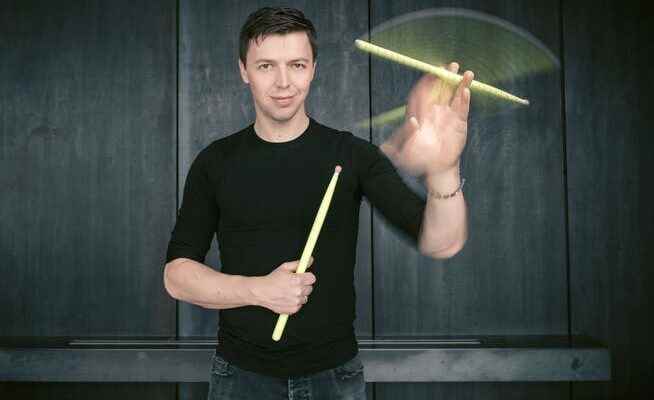He is a charismatic performer and has given the percussion a prominent place in classical concert. Martin Grubinger is now ending his career at the age of forty. It no longer needs him as a “lighthouse,” he says.
Acrobat and athlete on drums: Martin Grubinger.
Martin Grubinger is the ultimate multi-percussionist, owning over a thousand percussion instruments from all over the world. But that alone doesn’t make him the internationally best-known classical drummer. He also plays this huge arsenal of instruments on stage in countless variations, and when he whirls around between Viennese kettledrum and Japanese taiko drum with battle cries, his appearances often take on the character of a performance. With his charisma and his technical ability, he made the drums a serious solo instrument for many friends of classical music.
Now, however, Grubinger comes up with a bang of a completely different kind: years ago he announced that he wanted to retire at the age of forty. Grubinger will be forty in a few months and makes the announcement come true. In mid-December he said farewell to Zurich and Switzerland with the Swiss premiere of “Inferno”, a concerto for percussion and orchestra that the Icelandic composer Daníel Bjarnason tailored for him, and with two family concerts.
Like a high-performance athlete
The final act in Zurich with the Tonhalle Orchestra under Jukka-Pekka Saraste is not characterized by melancholy, but by pure joy of playing: as if he still hadn’t had enough of the big stage. Once Grubinger heaves violently thunderous cascades of sound out of the three movements of the «Inferno», then again he explores frequencies that are barely audible, still with almost childlike enthusiasm, always accompanied by eruptive and therefore all the more effective facial expressions.
This is Grubinger, the athlete who, with up to ten hours of practice a day, manages up to a thousand beats per minute on the drums. This is Grubinger, the entertainer, whose presence on stage makes the music pulsate in the room before he has even started the first beat. And that is Grubinger, the virtuoso who is always a real team player, for example when he forms a casual combo with the percussionists of the Tonhalle Orchestra in a family concert and beats Afrobeats.
For Grubinger, during his 25-year artistic career, percussion always meant overcoming borders and opposites, achieving top mental and motor performance. Grubinger trained the two-sidedness of his hands like a high-performance athlete. He demonstrated his stamina in “marathon concerts”, such as in 2006 in the Wiener Musikverein, where he performed countless rhythmic sequences, motor sequences, changes in tempi and dynamics for hours to the point of extreme exhaustion.
A universal language
As the son of drummer and teacher Martin Grubinger Sr., percussion instruments were omnipresent in his early childhood, such as a “drum that stood in the middle of the kitchen,” as Grubinger reveals in Zurich. The talent that the father encouraged in the son was accompanied by curiosity about the technical potential of the instruments. Grubinger came up against the limits of the concert literature for percussion at the time. And so he soon inspired well-known composers to write for him and the drums, to further develop the repertoire and the possible uses of the drums. Looking back today, Grubinger says that “we have grown together”.
Friedrich Cerha’s percussion concerto, which has now become part of the extended repertoire, is one of the more complex examples. Pieces often developed into veritable instrumental research projects in exchange with their creators, as in «Inferno». With the exploration of the potential of the game, Grubinger quickly became known to an ever-growing audience. He gave concerts with Lorin Maazel and Zubin Mehta, but also in the mainstream in front of an audience of millions at the Eurovision Song Contest 2015, whereupon the “Spiegel” derided him as a “pause drummer”.
Nevertheless, he remained true to his mission to convey the universal language of percussion to the audience. With his almost global arsenal of instruments, which he extensively acquired, he repeatedly drummed out political messages and took a stance. This year, for example, he supported the Ukraine aid and donated part of his fee to an aid project.
Pass on what you have achieved
And is this really supposed to be the end of it all? Sandra Studer, who moderates the family concert in Zurich, has to reassure herself that the whole thing is “not a joke”. But no, and when asked what was to come, Grubinger answered disarmingly honestly: “I want to study history”, that was a long-cherished dream. Only someone who has achieved everything on his instrument and is not dependent on the spotlight can say and do that.
Nevertheless, the music in his life will not completely fall silent. From the family concert in Zurich, an image stuck in my mind that points the way: children who go to Grubinger after the concert, ask him questions, want autographs, listen to him. This is Grubinger, the mediator: He has been teaching since 2015, including as a lecturer at the Zurich University of the Arts; since 2018 he has been a professor for classical percussion at the Salzburg Mozarteum. And here will probably be the place to preserve and pass on what has been achieved. Now it’s his students who are supposed to carry the possibilities of drums and the works written for him out into the world. He wants to train them so well that he is no longer needed as a “lighthouse”. “That’s the more sustainable way,” says Grubinger at last and puts on his boyish smile again.
